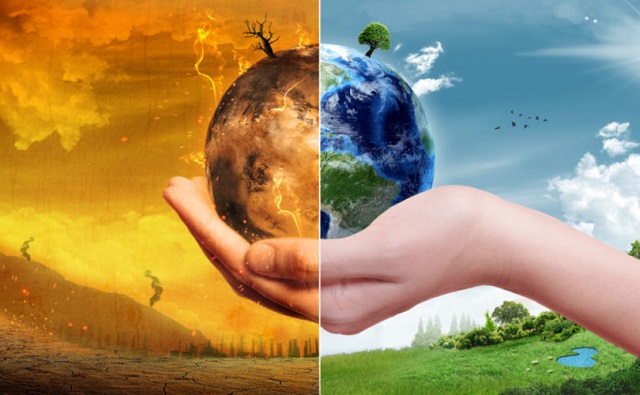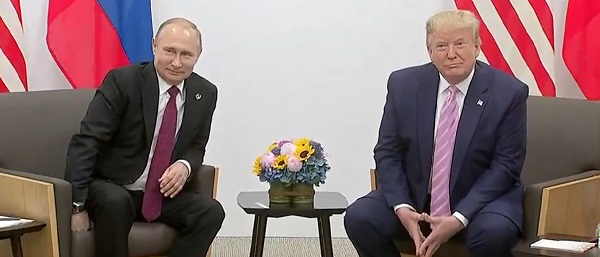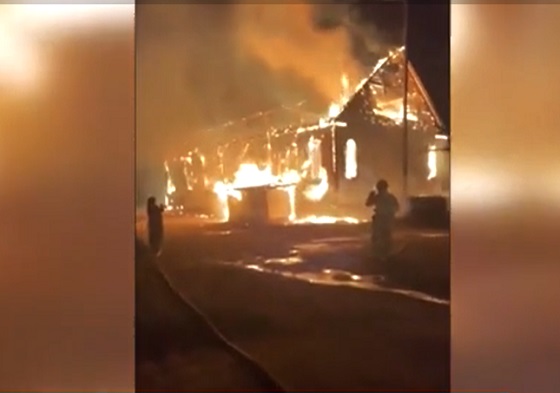International
Climate contrarians have the president’s ear

Made-in-American climate assessment challenges IPCC modelling, introducing alternative projections and recommendations that are shaping national conversations on environmental strategy and scientific credibility.
At the end of July, the U.S. Department of Energy (DOE) released a report on climate change that seemed surprisingly optimistic.
There’s good news and bad news. First, the bad news: We only have five years to live.
That’s according to U.S. Congresswoman Alexandria Ocasio-Cortez, who, you may recall, warned in January 2019: “The world is going to end in 12 years if we don’t address climate change.”
The good news is that AOC may have been exaggerating just a wee bit. And so has the Intergovernmental Panel on Climate Change (IPCC), according to the DOE’s Climate Working Group.
That’s my layman’s interpretation of what the 150-page DOE report says.
It mainly takes issue with climate models used by the IPCC. These models run too “hot” and, as a result, predict things like temperatures or extreme weather events that are not borne out by observation.
The report also notes that the IPCC appears to bury one positive consequence of more CO2 in the atmosphere: global “greening.”
They also question the assumptions that a warming planet necessarily has led to – or will lead to – increased extreme weather events.
Now, it should be noted that the report’s five authors are considered climate science heretics and contrarians, and their report has been dismissed and repudiated by 85 establishment scientists as “misleading or fundamentally incorrect.”
I would note that two of the group’s five authors — John Christy and Judith Curry — have both contributed to past IPCC assessments as lead or contributing authors. They’re not cranks – they are legit climate scientists who just happen to disagree with the “consensus” on some basic points.
The report was commissioned by U.S. Energy Secretary Chris Wright to provoke “a more thoughtful and science-based conversation about climate change and energy.”
“What I’ve found is that media coverage often distorts the science,” Wright says in a foreword to the report.
One such distortion is the repeated use of a worst-case scenario for warming (RCP8.5) that is considered so unlikely as to be “implausible,” but which produces better headlines and gets more grants than more probable, less scary scenarios for warming.
The five scientists and academics selected for the DOE’s climate working group are well-known for their climate science heterodoxy — Christy, Curry, Steven Koonin, Roy Spencer and Ross McKitrick (the sole Canadian on the team.)
Neither Wright nor the report’s authors deny the climate is changing. That would be hard to do. The earth has been warming ever since we came out of the last Ice Age.
The $122 trillion question is just how much the more recent heating has been the result of burning of fossil fuels. (It’s estimated that to hit net zero targets, we will need to spend US$3.5 trillion a year until 2050.)
“Climate change is real, and it deserves attention,” says Wright in the report. “But it is not the greatest threat facing humanity. That distinction belongs to global energy poverty.”
Pay attention, Canada. Like it or not, this is where America’s head is at right now. It is bumping climate action down the priority list and bumping up energy security and affordability, and if our own policies on environment and energy are too misaligned with America’s, we will continue to put our economy at a disadvantage.
Polling confirms there has been shift in attitude in just the last couple of years on climate and energy. On the hierarchy of fears, it appears climate change no longer tops the list.
Even Greta Thunberg took a sabbatical from climate activism to go fight the Israelites from a flotilla of diesel-burning boats in the Levant.
The climate catastrophism and alarmism that reached peak mania in 2019 may have led to both fatalism and fatigue. The DOE report goes some way to explaining where this fatigue and fatalism may be coming from.
Basically, it comes from environmentalists, politicians and the media taking worst-case scenarios from the IPCC and scaring the shit out of everyone with apocalyptic doomsaying.
Here are some highlights of the report, as I see it:
- modeling used by the IPCC may be tuned too “hot,” resulting in predicted global temperature increases that are not borne out by observable temperature data;
- IPCC assessments downplay the positive consequences of global “greening” resulting from increased amounts of CO2 in the atmosphere;
- worst-case scenarios for warming used by the IPCC are wholly improbable; and
- There is no evidence of long-term extreme weather events as a consequence of warming.

According to the DOE report, the models used by the IPCC for predicting climate sensitivity to CO2 predict temperature increases that are higher than actual observed temperature increases.
“The combination of overly sensitive models and implausible extreme scenarios for future emissions yields exaggerated projections of future warming,” the authors conclude.
When I reached McKitrick by phone, he explained what they mean by running too hot.
“There is a long-standing, almost universal pattern among the models, overstating the response to CO2 in the troposphere,” McKitrick told me. “Models warm too much. The models exhibit too much warming in response to rising CO2 and that also translates into too much surface warming.”
In more recent assessments, the IPCC has used a range of scenarios to predict how the planet might respond to increased GHGs. These scenarios – called Representative Concentration Pathways – range from RCP2.6 to RCP8.5.
RCP2.6 predicts global warming of below 2 degrees Celsius above pre-industrial temperatures. RCP8.5 predicts temperature increases of 5 degrees between 1900 and 2100 — which might indeed produce some hellish consequences.

AOC and Thunberg would be right to worry about this kind of temperature increase, if it were remotely plausible, and if nothing were being done to address GHG emissions.
The report notes that RCP8.5 came to be referred to as the no-policy baseline, or “business-as-usual” scenario. That’s the scenario in which nothing is done to try to reduce emissions.
But things are being done to reduce emissions. Efforts are being made the world over to adopt electric cars, phase out coal power, install wind and solar power, and capture and store CO2. So this worst-case scenario is probably not useful.
“The problem is, it’s routinely used in a lot of academic articles as what they call the business as usual outcome,” McKitrick said. “And most of the climate impact stories you see in the press are based on studies running RCP8.5. So you get these lurid outcomes of total devastation.
“It’s not just the IPCC. That’s a problem with the literature as a whole. Authors want to have the big, frightening splashy result, and then their article will get written up in the press.”
In 2020, Zeke Hausfather and Glen Peters wrote in Nature that the overuse of RCP8.5 as a business scenario “has resulted in a large number of misleading studies and media reporting.”
They characterized RCP8.5 as “implausible.”
“We must all …stop presenting the worst-case scenarios as the most likely one,” Hausfather and Peters wrote. “Overstating the likelihood of extreme climate impacts can make mitigation seem harder than it actually is.”
In other words, everyone reporting on climate change needs to tone things down a little. You’re scaring the children.
The DOE report criticizes the IPCC for downplaying one positive result of increased CO2 in the atmosphere — global greening.
It notes that “CO2 fertilization” had driven an increase in observed global photosynthesis by 30% since 1900, “versus 17% predicted by plant models.”
“The IPCC has minimally discussed global greening,” the authors note, but it is omitted in IPCC summary documents. These summary documents are the only ones that non-scientists (like journalists and politicians) tend to read, so it’s a bit of a buried story.
“This is a very important topic because rising CO2 levels have contributed to a massive greening of the planet,” McKitrick said. “On the agricultural front, there’s evidence that it has contributed substantially to crop productivity. And it also makes plants more tolerant to heat.
“There’s nothing controversial about those statements. They’re well established. But it’s never been pointed out in IPCC summaries.”
As for extreme weather events, modelling suggests that a warming planet should result in increased frequency and severity of things like hurricanes, droughts, and floods.
The report concludes that observational data suggests no long-term trend with respect to extreme weather events:
“Most extreme weather events in the U.S. do not show long-term trends,” the report states. “Claims of increased frequency or intensity of hurricanes, tornadoes, floods, and droughts are not supported by U.S. historical data.”
Generally, the DOE report posits a “lukewarmer” position on climate change – i.e. that the earth is warming, but that this may be more the result of natural causes, like solar activity, and less likely the result of CO2.
If this position is correct, it means the world will have spent trillions already on an energy transition that wasn’t necessary.
If this theory is wrong, then that investment in decarbonization and the energy transition is basically an insurance policy.
Nelson Bennett’s column appears weekly at Resource Works News. Contact him at [email protected].
Daily Caller
Trump, Putin Agree On High-Stakes Meetings To Negotiate End To Ukraine War


From the Daily Caller News Foundation
President Donald Trump and Russian President Vladimir Putin agreed to a pair of high-stakes meetings next week in order to negotiate an end to the Ukraine war, Trump said on Truth Social Thursday.
Trump will meet with Putin in Budapest, Hungary after an initial round of negotiations between Russian advisors and U.S. diplomats led by Secretary of State Marco Rubio next week, the president said in his post. Trump is set to meet with Ukrainian President Volodymyr Zelenskyy on Friday to discuss the war and his conversation with Putin.
“The United States’ initial meetings will be led by Secretary of State Marco Rubio, together with various other people, to be designated. A meeting location is to be determined,” Trump said in his post. “President Putin and I will then meet in an agreed upon location, Budapest, Hungary, to see if we can bring this ‘inglorious’ War, between Russia and Ukraine, to an end.”
“President Zelenskyy and I will be meeting tomorrow, in the Oval Office, where we will discuss my conversation with President Putin, and much more. I believe great progress was made with today’s telephone conversation,” he wrote.
Putin congratulated Trump on the historic deal between Hamas and Israel, and thanked First Lady Melania Trump for her work on protecting children in Ukraine, the president said in his post.
Trump said Wednesday that India will stop buying Russian oil, a deal that the administration said was fueling the war effort in Ukraine.
The meeting will mark Putin’s first visit to any European Union member state since before the invasion of Ukraine, when he attended a summit in Germany on the subject of peace.
espionage
Breaking: P.E.I. Urges RCMP Probe of Alleged Foreign Interference, Money Laundering

The Great Enlightment Buddhist Academy, PEI
Prince Edward Island’s government has formally asked the RCMP to investigate allegations of foreign interference and money laundering tied to Buddhist-affiliated organizations operating in the province — an escalation that follows The Bureau’s reporting and last week’s press conference on Parliament Hill calling for a federal public inquiry.
In a letter sent today to RCMP Commissioner Michael Duheme, Premier Rob Lantz and Minister of Housing Cory Deagle urge federal authorities to “review any evidence available, engage with the individuals who have made these claims, and conduct an investigation into any wrongdoing.” A companion letter was sent to FINTRAC, asking Canada’s financial intelligence unit to assess whether regulatory action is warranted.
The government move comes a week after The Bureau reported on findings presented at an October 8 news conference tied to the book Canada Under Siege: How P.E.I. Became a Forward Operating Base for the Chinese Communist Party.
In a following op-ed, co-author Garry Clement said the press conference had “set down a marker: Canada has entered a new era of contestation — over influence, sovereignty, and the integrity of its democratic institutions.” In related coverage by CBC, representatives of the religious groups have denied any links to the Chinese Communist Party or any improper dealings.
Clement and co-authors argued that the allegations demand “action, reform, and reckoning,” and called for a federal public inquiry with full powers — an appeal joined by former Solicitor General and long-time P.E.I. MP Wayne Easter, who urged an inquiry capable of compelling testimony and documents.
The Bureau also revealed a development that stunned Islanders: a response subpoenaed by P.E.I. lawmakers showed that an anticipated 2016–2018 Island Regulatory and Appeals Commission (IRAC) investigation into Buddhist-linked land holdings was never completed. A January 26, 2018 letter from IRAC’s appointed counsel notified firms representing the groups that the section 15 probe “has ended,” without public findings or any explanation of who ordered the closure or why. The disclosure raised fresh questions about oversight and potential conflicts, and now forms part of the backdrop to the province’s formal request for federal action.
The Bureau contacted IRAC last week with questions related to the agency’s management, including counsel relationships and prior positions within P.E.I. legal networks. New developments on this breaking story will be reported.
Today’s letter to RCMP Commissioner Duheme from the P.E.I. government explicitly references the October 8 statements by a former Solicitor General of Canada and a former RCMP Superintendent, noting it was “suggested that information exists that could provide grounds for a criminal investigation.” The Premier further flags assertions that P.E.I. has been used as “a forward operating base for the Chinese Communist Party,” calling the claim “serious” and stating it must be examined by federal agencies to determine whether any factual basis exists.
The province also points to what it describes as a newly mandated and ongoing investigation by IRAC into land holdings “associated with some of the same entities referenced in the public allegations,” using powers expanded in 2022 under the Lands Protection Act. Any findings with criminal or national-security implications, the letter says, will be referred to federal authorities.
The Bureau is a reader-supported publication.
To receive new posts and support my work, consider becoming a free or paid subscriber.
-

 National1 day ago
National1 day agoDemocracy Watch Renews Push for Independent Prosecutor in SNC-Lavalin Case
-

 Alberta1 day ago
Alberta1 day agoClick here to help choose Alberta’s new licence plate design
-

 International1 day ago
International1 day agoHamas will disarm or die
-

 illegal immigration1 day ago
illegal immigration1 day agoLos Angeles declares a state of emergency over ICE deportations
-

 International1 day ago
International1 day agoDaughter convinces healthy father to die in double assisted suicide with mother
-

 International1 day ago
International1 day agoUS Warns Hamas To Halt Executions
-

 Business1 day ago
Business1 day ago‘Taxation Without Representation’: Trump Admin Battles UN Over Global Carbon Tax
-

 Indigenous24 hours ago
Indigenous24 hours agoConstitutional lawyer calls for ‘false’ claims to end in Canadian residential schools burials








